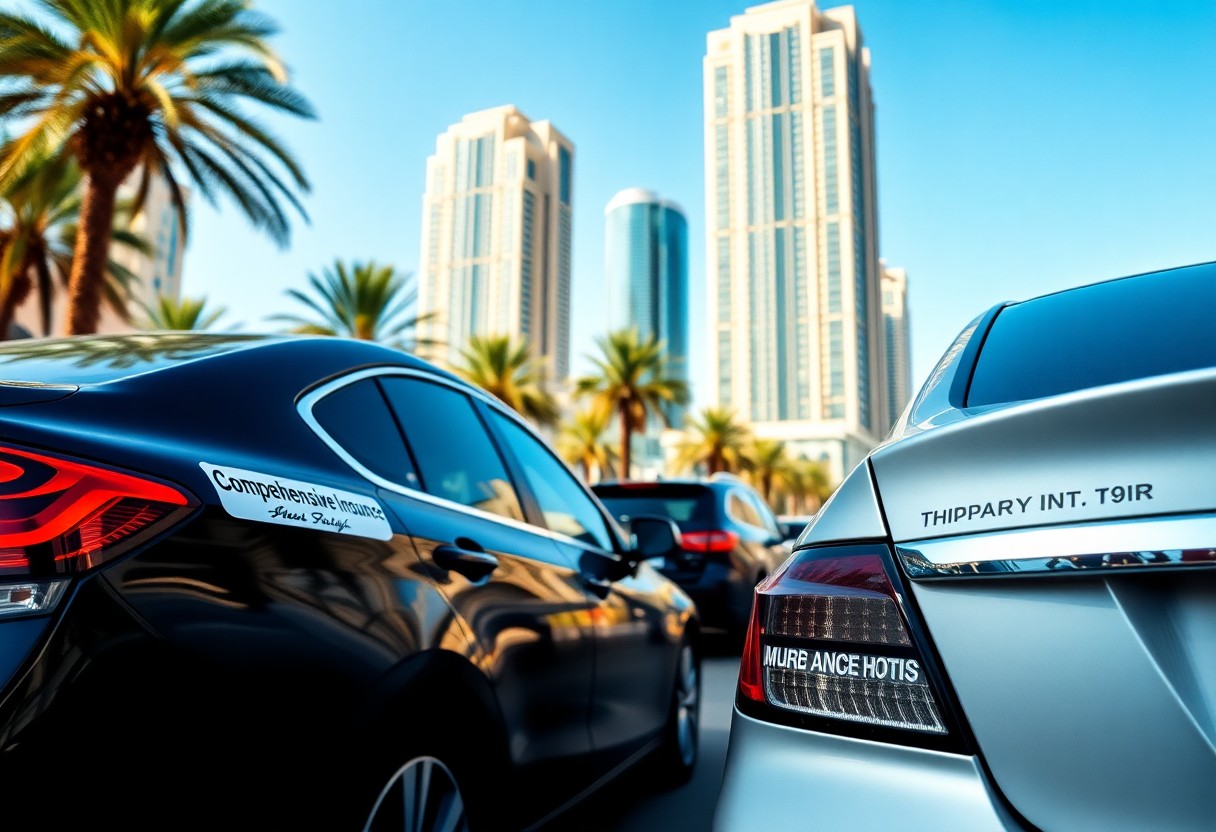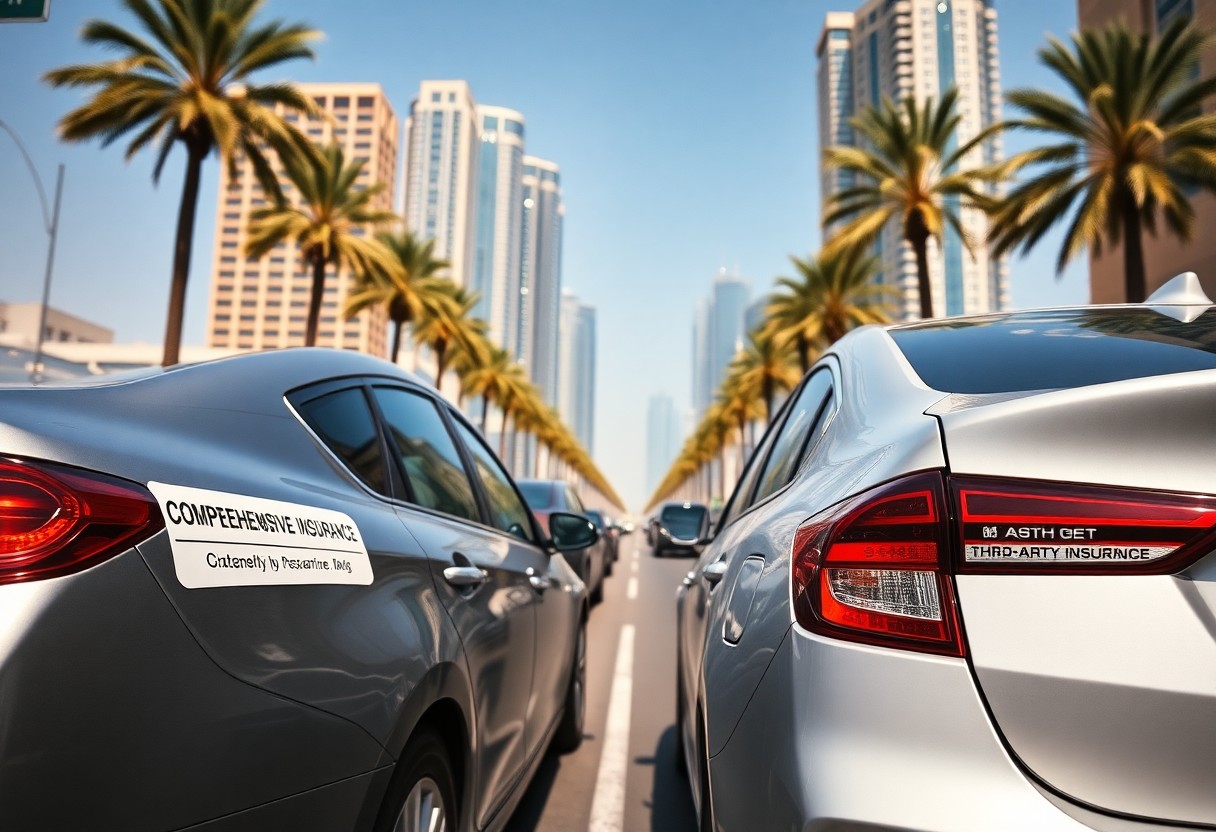You need to understand the fundamental differences between comprehensive and third-party motor insurance in Dubai to make an informed decision about your coverage. While comprehensive insurance offers extensive protection for your vehicle against accidents, theft, and natural disasters, third-party insurance mainly covers damages to others in an accident, leaving you exposed. Evaluating your driving habits, the value of your car, and your budget will help you determine which insurance type aligns best with your needs and offers the right balance of protection and cost.
Key Takeaways:
- Comprehensive insurance covers a wider range of incidents, including theft, vandalism, and natural disasters, while third-party insurance only covers damages to other vehicles and injuries to others.
- Comprehensive policies typically have higher premiums due to the extended coverage, whereas third-party insurance is more affordable but offers limited protection.
- Consider your vehicle’s value; comprehensive insurance may be more beneficial for new or high-value cars.
- Evaluate your driving habits and environment; urban areas may require more extensive coverage due to higher accident rates.
- Check legal requirements; third-party insurance is mandatory in the UAE, while comprehensive coverage is optional but recommended for peace of mind.
Understanding Motor Insurance in Dubai
Motor insurance in Dubai is a legal requirement for all vehicle owners, aimed at providing financial protection against liabilities arising from accidents. Two primary types dominate the market: comprehensive and third-party insurance. This framework ensures that you are covered for damages caused to others as well as potential damages to your own vehicle, depending upon the type of policy you select.
Overview of Motor Insurance
Motor insurance in Dubai encompasses various policies designed to protect your vehicle and finances. Comprehensive coverage offers extensive protection, including damages from accidents, theft, and natural disasters. On the other hand, third-party insurance only covers damages to others, leaving you vulnerable in certain situations. Choosing the right policy requires careful consideration of your specific needs.
Legal Requirements for Insurance
In Dubai, the law mandates that all vehicle owners hold a valid motor insurance policy. This coverage must at least meet the minimum requirements for third-party liability, ensuring that damages to others are financially covered in case of an accident. Driving without insurance can lead to hefty fines and legal repercussions.
According to Dubai law, all vehicles must possess a minimum level of third-party liability insurance, which covers costs for injuries and property damages inflicted on third parties during an accident. The penalties for not having insurance can include fines of up to AED 500, 12 black points on your driving record, and vehicle impoundment. Companies operating in the market often offer tailored packages to meet both legal requirements and individual needs, making it vital to compare options before deciding on your policy.

Comprehensive Motor Insurance
Comprehensive motor insurance offers extensive protection for your vehicle, covering damages from accidents, theft, natural disasters, and vandalism. Unlike basic policies, it ensures you’re safeguarded against a range of risks that could financially impact you. While the premium may be higher, the peace of mind and security provided by such coverage often outweighs the initial cost.
Coverage and Benefits
Your comprehensive policy typically includes benefits such as collision coverage, which pays for damages from accidents, theft protection, and fire damage. Additionally, many providers offer personal accident coverage, coverage for passengers, and roadside assistance, ensuring you’re protected in various situations.
Cost Considerations
Pricing for comprehensive insurance can vary significantly based on factors like age, driving history, and the vehicle’s make and model. Generally, the premium will be higher than that of third-party insurance due to the extensive coverage. However, many insurers provide discounts for safe driving records, bundling policies, or installing anti-theft devices.
On average, comprehensive insurance in Dubai could range from AED 2,500 to AED 7,000 annually, depending on your vehicle’s value and your personal profile. While the initial outlay might seem steep, the potential savings from avoiding out-of-pocket expenses for repairs or replacements can be substantial. Choosing the right level of coverage tailored to your driving habits and vehicle condition can lead to long-term financial benefits. Evaluating quotes from multiple providers can also help identify the best deal.

Third-Party Motor Insurance
Third-party motor insurance is a basic form of coverage that protects you against liabilities resulting from accidents involving other vehicles or property. This policy does not cover damage to your own vehicle, making it necessary for drivers seeking minimum legal requirements. You are liable for any damages to the other party, ensuring they receive compensation for injuries or damage caused by you.
Coverage and Limitations
Coverage under third-party motor insurance primarily includes legal liabilities incurred due to bodily injuries or property damage to others. However, it does not extend to your own vehicle’s damage or personal injuries. In Dubai, this coverage meets the mandatory requirements but can leave you exposed to significant out-of-pocket expenses if an accident occurs.
Affordability and Value
Third-party motor insurance is generally more affordable than comprehensive policies, making it a popular choice for budget-conscious drivers. Monthly premiums can vary but often range between AED 400 to AED 1,200, depending on the insurer and driver’s profile. The lower cost offers you the assurance of meeting legal requirements while maintaining your financial flexibility.
Third-party insurance keeps costs down and is attractive for those unfamiliar with driving conditions or who use their vehicles less frequently. While it provides necessary protection against liabilities, you must weigh the risks of potential losses from accidents. For instance, if you cause significant damage to another vehicle, the costs can quickly escalate beyond your premium savings. Evaluating your driving habits and the frequency of usage can further guide your decision on whether third-party coverage suffices for your needs.
Comparing Comprehensive and Third-Party Insurance
The choice between comprehensive and third-party motor insurance hinges on your specific needs and risk tolerance. While comprehensive insurance offers broad protection, including coverage for theft and damage to your vehicle, third-party insurance is typically more affordable but limited to covering damages to others. To explore the different Types of Car Insurance in the UAE Your Guide to Choosing …, it’s beneficial to assess your driving habits and vehicle value.
| Comprehensive Insurance | Broad coverage, including theft, vandalism, and damage to your vehicle |
| Third-Party Insurance | Protects against liabilities for damages to others only |
Risk Assessment
Evaluating risks is necessary in determining the right insurance. Comprehensive insurance is suited for high-value vehicles or frequent drivers, as it provides extensive coverage that mitigates financial loss from accidents or damage. Conversely, if you own an older vehicle or drive infrequently, third-party insurance could suffice, as it limits your exposure to liability while minimizing costs.
Claim Process and Payouts
The claim process significantly impacts your experience with both insurance types. With comprehensive insurance, you may benefit from quicker claims processing, as many major insurers have streamlined their operations to handle all aspects of coverage under one policy. On the other hand, third-party insurance can lead to longer claim resolution times, as it often requires coordination between multiple parties involved in the accident.
Comprehensive insurance typically allows you to file claims directly with your insurer, leading to faster payouts since they handle both your claims and any third-party liabilities. For example, an insurer might provide you with a replacement vehicle while your claim is processed. Third-party claims can involve more complicated negotiations, often leaving you in a vulnerable position when waiting for resolutions. Understanding these dynamics can greatly influence your choice of coverage.
Factors to Consider When Choosing Insurance
- Driving habits
- Vehicle type
- Insurance costs
- Coverage needs
- Claims process
The decision to select the right insurance involves evaluating these core factors to align your coverage with your unique circumstances.
Driving Habits and Vehicle Type
Your driving habits significantly influence the type of insurance you need. If you frequently drive in high-traffic areas or take long journeys, comprehensive insurance might be necessary for added protection. The type of vehicle also plays a role; high-performance cars often require more extensive coverage due to increased repair costs and higher risk profiles.
Budget and Financial Implications
Your budget largely dictates the insurance options you can pursue. Comprehensive insurance tends to have higher premiums, but it grants a wider coverage spectrum. On the other hand, third-party insurance, being more affordable, limits your protection to third-party damages. Balancing your financial capability with desired coverage is key for optimal insurance selection.
Assessing your budget against premiums is vital when deciding on your motor insurance. Comprehensive policies can range from AED 1,500 to AED 3,000 annually, depending on your vehicle’s make and model. Alternatively, third-party insurance premiums might fall between AED 800 to AED 1,200. Calculating potential out-of-pocket expenses from potential accidents is also necessary to determine the long-term value of your insurance choice. The balance between coverage and cost will be pivotal in your final decision.
Frequently Asked Questions
This section addresses common queries regarding motor insurance in Dubai, clarifying necessary points about coverage options, claims processes, and policy requirements. Understanding these aspects helps in making informed decisions tailored to your personal needs. From pricing comparisons to tips on lowering premiums, these FAQs will provide the insights you require to navigate your insurance journey effectively.
Common Myths About Motor Insurance
A variety of misconceptions often cloud the understanding of motor insurance. For instance, many believe that third-party insurance is sufficient for any vehicle, ignoring potential damages to their own property or injuries sustained in accidents. Additionally, some assume comprehensive policies are too expensive, overlooking how competitive rates can be when considering the broader coverage they provide. These myths can lead to inadequate protection and higher costs in the long run.
Key Takeaways
To choose the right motor insurance, you must evaluate your specific needs against the coverage options available. Comprehensive insurance offers broad protection, significantly reducing out-of-pocket expenses from accidents, theft, or other incidents, while third-party insurance remains the budget-friendly choice for minimal liability coverage.
The decision between comprehensive and third-party motor insurance hinges on your individual situation, driving habits, and financial priorities. If you own a newer vehicle or drive frequently in high-traffic areas, comprehensive coverage may offer valuable peace of mind. In contrast, if your vehicle is older and has a low market value, third-party insurance could be a cost-effective solution while still fulfilling legal requirements. Balancing your risk tolerance and financial capacity is necessary to ensuring you select the most appropriate coverage for your lifestyle in Dubai.
To wrap up
Presently, choosing between comprehensive and third-party motor insurance in Dubai depends on your individual needs and circumstances. If you seek extensive coverage that protects you against a variety of risks, comprehensive insurance may be suitable for you. Conversely, if you prefer a more budget-friendly option that covers only third-party liabilities, third-party insurance might be the right choice. Assess your financial situation, driving habits, and the value of your vehicle to make an informed decision that best aligns with your requirements.
FAQ
Q: What is Comprehensive Motor Insurance?
A: Comprehensive Motor Insurance covers a wide range of risks, including damage to your vehicle, theft, and third-party liabilities. It protects against accidents, natural disasters, and vandalism, offering extensive financial security for the policyholder.
Q: What does Third-Party Motor Insurance cover?
A: Third-Party Motor Insurance only covers damages or injuries you cause to others in an accident. It does not cover any damages to your own vehicle or injuries you sustain, making it the minimum legal requirement to drive in Dubai.
Q: Which type of insurance is more expensive?
A: Comprehensive Motor Insurance tends to be more expensive than Third-Party Motor Insurance due to its broader coverage and higher protection levels. The additional cost reflects the wider risks it covers for the insured vehicle.
Q: Which insurance should I choose if I own an older vehicle?
A: If you own an older vehicle with a lower market value, Third-Party Motor Insurance may be more suitable. It provides basic liability coverage at a reduced premium compared to Comprehensive Insurance, which may not be financially viable for older cars.
Q: Does Comprehensive Insurance include personal accident cover?
A: Yes, many Comprehensive Motor Insurance policies offer personal accident cover as an optional add-on. This provides financial support in case of injuries sustained by the driver or passengers in an accident, enhancing the overall protection offered by the policy.





0 Comments